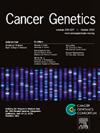g蛋白信号传导14 (RGS14)调控因子促进肝细胞癌的生长
IF 2.1
4区 医学
Q4 GENETICS & HEREDITY
引用次数: 0
摘要
背景:肝细胞癌(HCC)是全球癌症相关死亡的主要原因。HCC的发展受到一系列内在和外在因素的影响,需要进一步研究其分子机制。虽然g蛋白信号传导调节因子14 (RGS14)在癌症生物学中显示出新的作用,但其在HCC中的功能仍不清楚。材料和方法采用TCGA-LIHC、HCCDB和GEO数据集分析srgs14的表达及临床意义。免疫荧光(IF)染色验证蛋白表达。通过功能分析,包括细胞增殖、迁移、侵袭和体内异种移植模型,来评估RGS14的致癌作用。在原位肿瘤组织中进行Bulk-mRNA测序以鉴定rgs14调控的通路。结果rgs14在HCC组织中表达显著上调,与患者预后不良呈正相关。体外实验证实RGS14能增强HCC细胞的增殖、迁移和侵袭,体内研究证实其促瘤作用。机制上,RGS14激活细胞外基质(ECM)-受体相互作用途径,驱动HCC进展。结论RGS14可作为一种新的HCC预后标志物和治疗靶点,有助于改善HCC的治疗策略。本文章由计算机程序翻译,如有差异,请以英文原文为准。
Regulator of G-protein signaling 14 (RGS14) promotes cancer growth in hepatocellular carcinoma
Background
Hepatocellular carcinoma (HCC) is a major contributor to cancer-related deaths globally. The progression of HCC is influenced by a range of intrinsic and extrinsic factors, necessitating further research into the molecular mechanisms involved. While Regulator of G-protein Signaling 14 (RGS14) has shown emerging roles in cancer biology, its function in HCC remains poorly characterized.
Materials and methods
RGS14 expression and clinical significance were analyzed using TCGA-LIHC, HCCDB, and GEO datasets. Immunofluorescence (IF) staining was employed to validate protein expression. Functional assays, including cell proliferation, migration, invasion, and in vivo xenograft models, were conducted to assess the oncogenic role of RGS14. Bulk-mRNA sequencing was performed using in situ tumor tissues to identify RGS14-regulated pathways.
Results
RGS14 was significantly upregulated in HCC tissues and positively associated with poor patient outcomes. In vitro experiments demonstrated that RGS14 enhanced HCC cell proliferation, migration, and invasion, while in vivo studies confirmed its tumor-promoting effects. Mechanistically, RGS14 activated the extracellular matrix (ECM)-receptor interaction pathway to drive HCC progression.
Conclusion
Our findings suggest that RGS14 could serve as a novel prognostic marker and therapeutic target for HCC, contributing to improved treatment strategies.
求助全文
通过发布文献求助,成功后即可免费获取论文全文。
去求助
来源期刊

Cancer Genetics
ONCOLOGY-GENETICS & HEREDITY
CiteScore
3.20
自引率
5.30%
发文量
167
审稿时长
27 days
期刊介绍:
The aim of Cancer Genetics is to publish high quality scientific papers on the cellular, genetic and molecular aspects of cancer, including cancer predisposition and clinical diagnostic applications. Specific areas of interest include descriptions of new chromosomal, molecular or epigenetic alterations in benign and malignant diseases; novel laboratory approaches for identification and characterization of chromosomal rearrangements or genomic alterations in cancer cells; correlation of genetic changes with pathology and clinical presentation; and the molecular genetics of cancer predisposition. To reach a basic science and clinical multidisciplinary audience, we welcome original full-length articles, reviews, meeting summaries, brief reports, and letters to the editor.
 求助内容:
求助内容: 应助结果提醒方式:
应助结果提醒方式:


